FPF at PDP Week 2025: Generative AI, Digital Trust, and the Future of Cross-Border Data Transfers in APAC
Authors: Darren Ang Wei Cheng and James Jerin Akash (FPF APAC Interns)
From July 7 to 10, 2025, the Future of Privacy Forum (FPF)’s Asia-Pacific (APAC) office was actively engaged in Singapore’s Personal Data Protection Week 2025 (PDP Week) – a week of events hosted by the Personal Data Protection Commission of Singapore (PDPC) at the Marina Bay Sands Expo and Convention Centre in Singapore.
Alongside the PDPC’s events, PDP Week also included a two-day industry conference organized by the International Association of Privacy Professionals (IAPP) – the IAPP Asia Privacy Forum and AI Governance Global.
This blog post presents key takeaways from the wide range of events and engagements that FPF APAC led and participated in throughout the week. Key themes that emerged from the week’s discussions included:
- AI governance has moved beyond principles to practice, policies, and passed laws: Organizations are now focused on the practical steps to be taken for developing and deploying AI responsibly. This requires a cross-functional approach within organizations and thorough due diligence when procuring third-party AI solutions.
- Digital trust has become a greater imperative: As AI systems and other digital technologies become more complex, building digital trust and ensuring that technology aligns with consumer and societal expectations are critical to maximizing the potential benefits.
- The future of the digital economy will be shaped by the trajectory of cross-border data transfers: There is a tension, both in the APAC region and globally, between the rise of restrictive data transfer requirements, and the fact that data transfers are essential for the digital economy and the development of high-quality AI systems.
- Technical and legal solutions for privacy are gaining ground: In response to the complex landscape of data transfer rules, stakeholders are actively exploring practical solutions such as Privacy Enhancing Technologies (PETs), internationally-recognized certifications, or mechanisms such as the ASEAN Model Contractual Clauses (MCCs).
In the paragraphs below, we elaborate on some of these themes, as well as other interesting observations that came up over the course of FPF’s involvement in PDP Week.
1. FPF’s and IMDA’s co-hosted workshop shared practical perspectives for companies navigating the waters of generative AI governance.
On Monday, July 7, 2025, FPF joined the Infocomm Media Development Authority of Singapore (IMDA) in hosting a workshop for Singapore’s data protection community, titled “AI, AI, Captain!: Steering your organisation in the waters of Gen AI by IMDA and FPF.” The highly-anticipated event provided participants with practical knowledge about AI governance at the organizational level.
The event was hosted by Josh Lee Kok Thong, Managing Director of FPF APAC, and was attended by around 200 representatives from industry, including data protection officers (DPOs) and chief technology officers (CTOs). FPF’s segment of the workshop had two parts: an informational segment featuring presentations from FPF and IMDA, followed by a multi-stakeholder, practice-focused panel discussion.
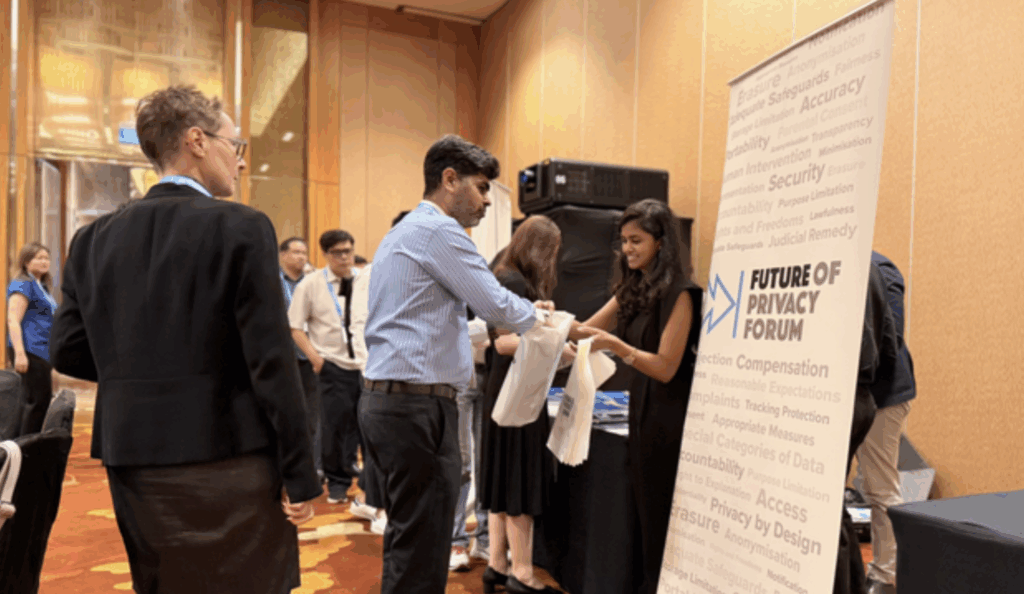
FPF at “AI, AI, Captain! – Steering your organisation in the waters of Gen AI by IMDA and FPF”, July 8, 2025.
1.1 AI governance in APAC is neither unguided nor ungoverned, as policymakers are actively working to develop both soft and hard regulations for AI and to clarify how existing data protection laws apply to its use.
Josh presented on global AI governance, highlighting the rapid legislative changes in the APAC region over the past six months, and comparing developments in South Korea, Japan, and Vietnam with those in the EU, US, and Latin America. He then discussed how data protection laws – especially provisions on consent, data subject rights, and breach management – impact AI governance and how data protection regulators in Japan, South Korea, and Hong Kong (among others) have provided guidance on this.
Josh’s presentation was followed by one from Darshini Ramiah, Senior Manager of AI Governance and Safety at IMDA. Darshini provided an overview of Singapore’s approach to AI governance, which is built on three key pillars:
- Creating practical tools, such as the AI Verify toolkit and Project Moonshot, which enable benchmarking and red teaming of both traditional AI systems and large language models (LLMs) respectively;
- Engaging closely with international partners, such as through the ASEAN Working Group on AI Governance and the publication of the AI Playbook for Small States under the Digital Forum of Small States; and
- Collaborating with industry in the development of principles and tools around AI governance.
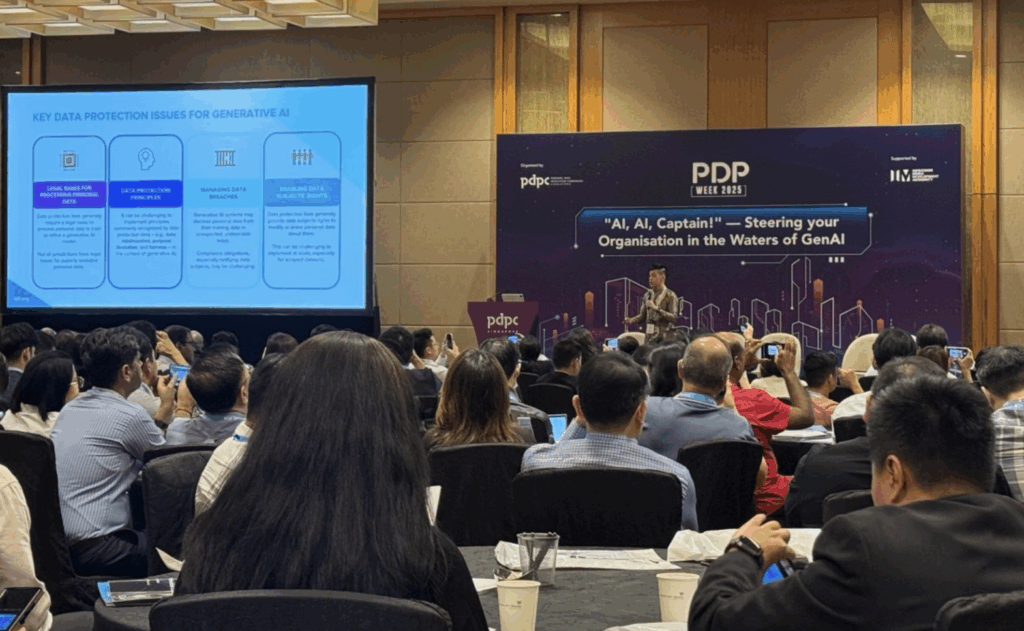
FPF presenting at “AI AI Captain – Steering your organisation in the waters of Gen AI by IMDA and FPF”, July 8, 2025.
1.2 FPF moderated a panel session that focused on key aspects of AI governance and featured industry experts and regulators.
The panel session of the workshop, moderated by Josh, included the following experts:
- Darshini Ramiah, Senior Manager, AI Governance and Safety at IMDA;
- Derek Ho, Deputy Chief Privacy, AI and Data Responsibility Officer at Mastercard; and
- Patrick Chua, Senior Principal Digital Strategist at Singapore Airlines (SIA).
The experts discussed AI governance from both an industry and regulatory perspective.
- The panelists highlighted that AI governance is cross-functional and requires collaborative effort from the various teams in the organization to be successful.
- One of the panelists suggested looking at the Principles, People, Process and Technology (“3Ps and a T”) when considering AI governance. The panelists agreed on the importance of clearly defining values that serve as a “North Star” to guide their organization’s cross-functional AI governance efforts and to build strong support from senior management for related initiatives.
- For small and medium enterprises (SMEs), the panelists emphasized that a structured but scalable governance model could help SMEs to manage AI risk effectively. SMEs can start by referring to existing resources like IMDA’s guidelines, such as the Model AI Governance Framework.
- Recognizing that many organizations in Singapore will be procuring ready-made AI solutions rather than developing their own models in-house, panelists highlighted the need for strong due diligence. This includes examining the model cards which disclose the model’s key metrics, adopting contractual safeguards from third party vendors, and deploying the technology in stages to further limit risk.
- Singapore is also working to standardize AI transparency for industry. IMDA is exploring several areas, including the introduction of standardized disclosure formats for AI model developers, such as standardized model cards.
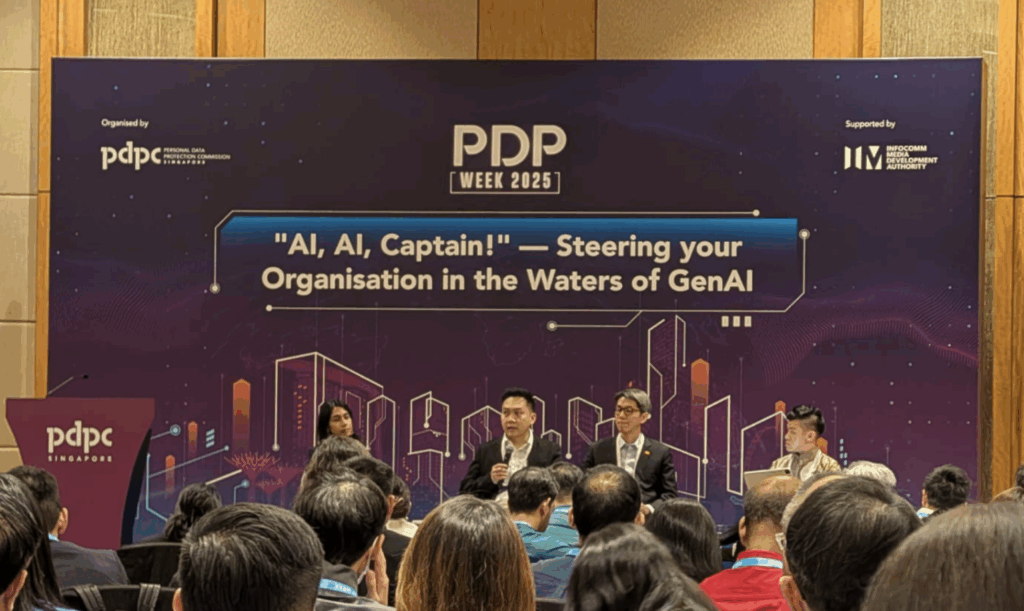
FPF moderating the panel session at “AI AI Captain – Steering your organisation in the waters of Gen AI by IMDA and FPF”, July 8, 2025.
2. FPF facilitated deep conversations at PDPC’s PETs Summit, including on the use of PETs in cross-border data transfers and within SMEs.
2.1 FPF moderated a fireside chat on PETs use cases during the opening Plenary Session.
On Tuesday, July 8, 2025 FPF APAC participated in a day-long PETs Summit, organized by the PDPC and IMDA. During the opening plenary session, Josh moderated a fireside chat with Fabio Bruno, Assistant Director of Applied Innovation at INTERPOL, titled “Solving Big Problems with PETs.” Following panels that covered use cases for PETs and policies that could increase their adoption, this fireside chat looked at how PETs could present fresh solutions to long-standing data protection issues (such as cross-border data transfers).
In this regard, Fabio shared how law enforcement bodies around the world have been exploring PETs to streamline investigations. He highlighted ongoing exploration of certain PETs, such as zero-knowledge proofs (a cryptographic method that allows one party to prove to another party that a particular piece of information is true without revealing any additional information beyond the validity of the claim) and homomorphic encryption (a family of encryption schemes allowing for computations to be performed directly on encrypted data without having to first decrypt it). In a law enforcement context, these PETs enable preliminary validation that can help to reduce delays and lower the cost of investigations, while also helping to protect individuals’ privacy.
Notwithstanding the potential of PETs for cross-border data transfers (even for commercial, non-law enforcement contexts), challenges exist. These include: (1) enhancing and harmonizing the understanding and acceptability of PETs among data protection regulators globally; and (2) obtaining higher management support to invest in PETs. Nevertheless, the fireside chat concluded with optimism about the prospect of the greater use of PETs for data transfers, and left the audience with plenty of food for thought.
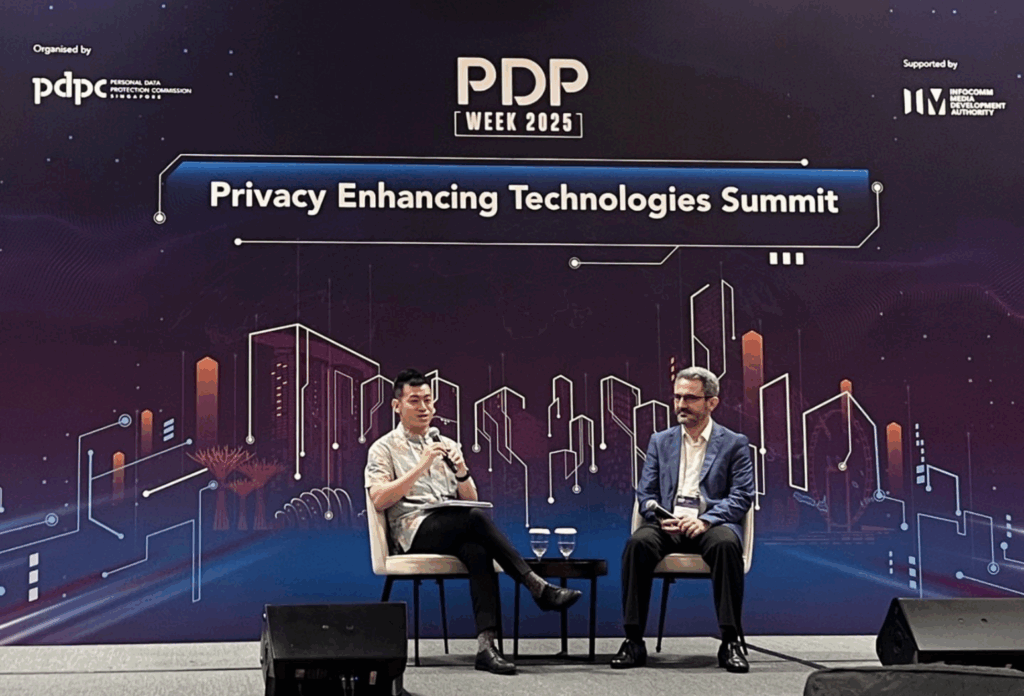
FPF moderating the fireside chat at PETs Summit Plenary Session, July 8, 2025
2.2 FPF Members facilitated an engaging PETs Deep Dive Session that explored business use cases for PETs.
After the plenary session, FPF APAC teammates Dominic Paulger, Sakshi Shivhare, and Bilal Mohamed facilitated a practical workshop, titled the “PETs Deep Dive Session” that was organized by the IMDA. Drawing on the IMDA’s draft PETs Adoption Guide, the workshop aimed to help Chief Data Officers, DPOs, and AI and data product teams understand which PETs best fit their business use cases.
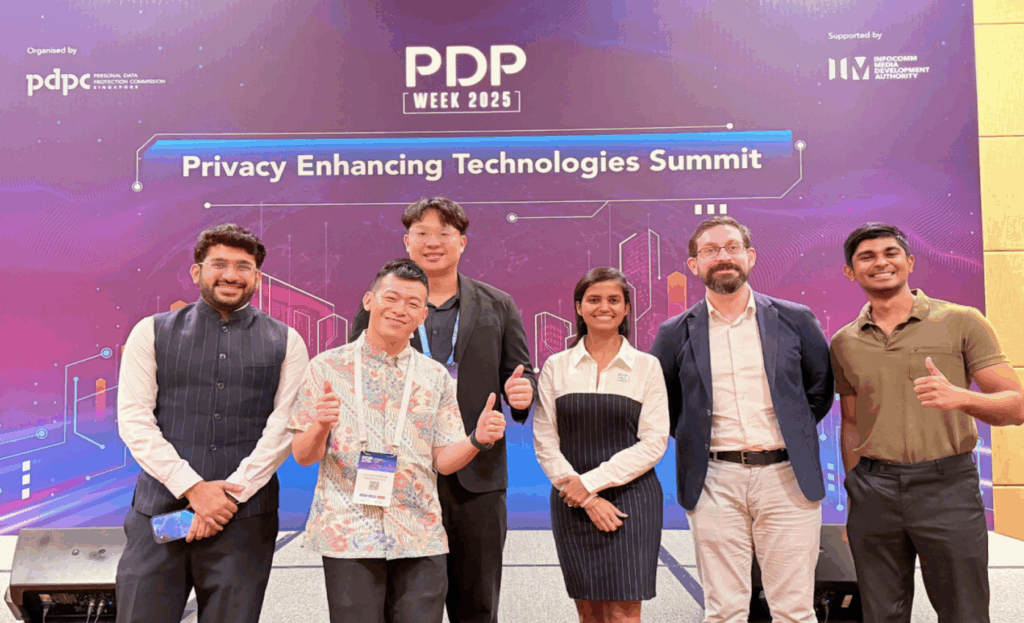
FPF APAC Team at PETs Summit, July 8, 2025
3. On Wednesday, FPF joined a discussion at IAPP Asia Privacy Forum on how regulators and major tech companies in the APAC region are fostering “digital trust” in AI by aligning technology with societal expectations.
On Wednesday, July 9, 2025, FPF APAC participated in an IAPP Asia Privacy Forum panel titled “Building Digital Trust in AI: Perspectives from APAC.” Josh joined Lanah Kammourieh Donnelly, Global Head of Privacy Policy, at Google, and Lee Wan Sie, Cluster Director for AI Governance and Safety at the IMDA for a panel moderated by Justin B. Weiss, Senior Director at Crowell Global Advisors.
A key theme from the panel was that, given the opacity of many digital technologies, the concept of digital trust is essential to ensure that these technologies work in ways that protect important societal interests. Accordingly, the panel discussed strategies that could foster digital trust.
Wan Sie provided the regulator’s perspective and acknowledged that given the rapid pace of AI development, regulation would always be “playing catch-up.” Thus, instead of implementing a horizontal AI law, she shared how Singapore is focusing on making the industry more capable of using AI responsibly. Wan Sie pointed to AI Verify, Singapore’s AI governance testing framework and toolkit, and the IMDA’s new Global AI Assurance Sandbox, as mechanisms that help organizations ensure their AI systems could demonstrate greater trustworthiness to users.
Josh focused on trends from across the APAC region, sharing how regulators in Japan and South Korea have been actively considering amendments to their data protection laws to expand the legal bases for processing personal data, in order to facilitate greater availability of data for training high-quality AI systems.
Lanah highlighted Google’s approach of developing AI responsibly in accordance with certain core privacy values, such as those in the Fair Information Practice Principles (FIPPs). For example, she shared how Google is actively researching technological solutions like training its models on synthetic data instead of using publicly-available datasets from the Internet which may contain large amounts of personal data.
Overall, the panel noted that APAC is taking its own distinct approach to AI governance – one in which industry and regulators collaborate actively to ensure principled development of technology.
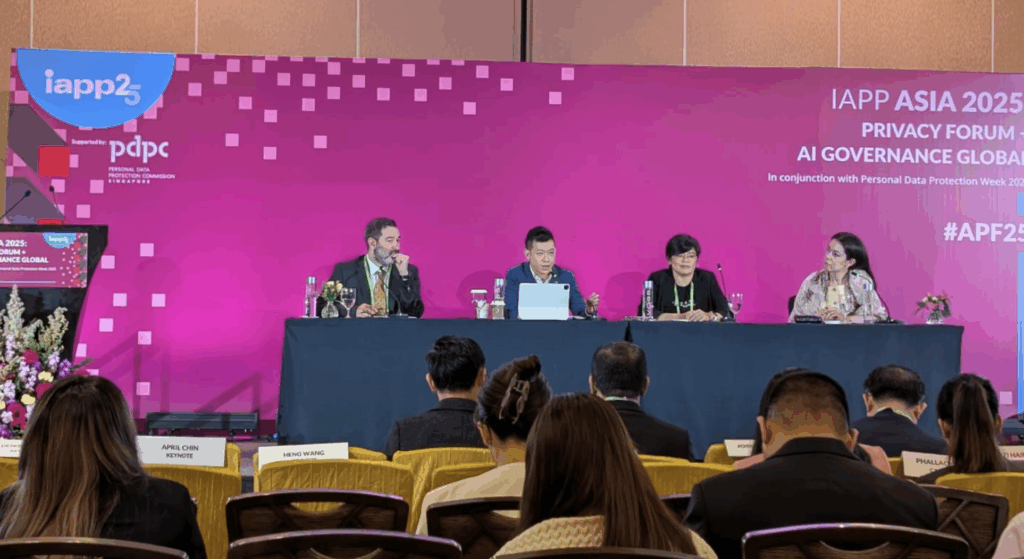
FPF and the “Building Digital Trust in AI: Perspectives from APAC” panel at IAPP, 9 July 2025.
4. On Thursday, FPF staff moderated two panels at IAPP AI Governance Global on cross-border data transfers and regulatory developments in Australia
4.1 While cross-border data transfers are fragmented and restrictive, there is cautious optimism that APAC will pursue interoperability.
On Thursday, July 10, 2025, FPF organised a panel titled “Shifting Sands: The Outlook for Cross Border Data Transfers in APAC” which featured Emily Hancock, Vice President and Chief Privacy Officer at Cloudflare, Arianne Jimenez, Head of Privacy and Data Policy and Engagement for APAC at Meta and Zee Kin Yeong, Chief Executive of the Singapore Academy of Law and FPF Senior Fellow. Moderated by Josh, the panel discussed evolving regulatory frameworks for cross-border data transfers in APAC.
The panel first observed that the landscape for cross-border data transfers across APAC remains fragmented. Emily elaborated that restrictions on data transfer were a global phenomenon and attributable to how data is increasingly viewed as a national security matter, making governments less willing to lower restrictions and pursue interoperability.
Despite this challenging landscape, the panel members were cautiously optimistic that transfer restrictions could be managed effectively. Zee Kin highlighted how the increasing integration of economies through supranational organizations like ASEAN is driving a push in APAC towards recognizing more business-friendly data transfer mechanisms, such as the ASEAN MCCs. He also noted that regulators often relax restrictions once local businesses start to expand operations overseas and need to transfer data across borders.
Arianne suggested that businesses communicate to regulators the challenges they face with restrictive data transfer frameworks. She acknowledged that SMEs are often not as well-resourced as multi-national corporations (MNCs), and thus faced difficulties in navigating the complex patchwork of regulations across the region. She explained that since regulators in APAC are generally open to consultation, businesses should take the opportunity to advocate for more interoperability.
The panel concluded by highlighting the importance of data transfers to AI development. Cross-border data transfers are crucial to fostering diverse datasets, accessing advanced computing infrastructure, combating global cyber-threats by enabling worldwide threat sharing, and reducing the environmental impact by limiting the need for additional data centers. Overall, the panel expressed hope that despite the legal fragmentation and complicated state of play, the clear benefits of cross-border data transfers would encourage jurisdictions to pursue greater interoperability.
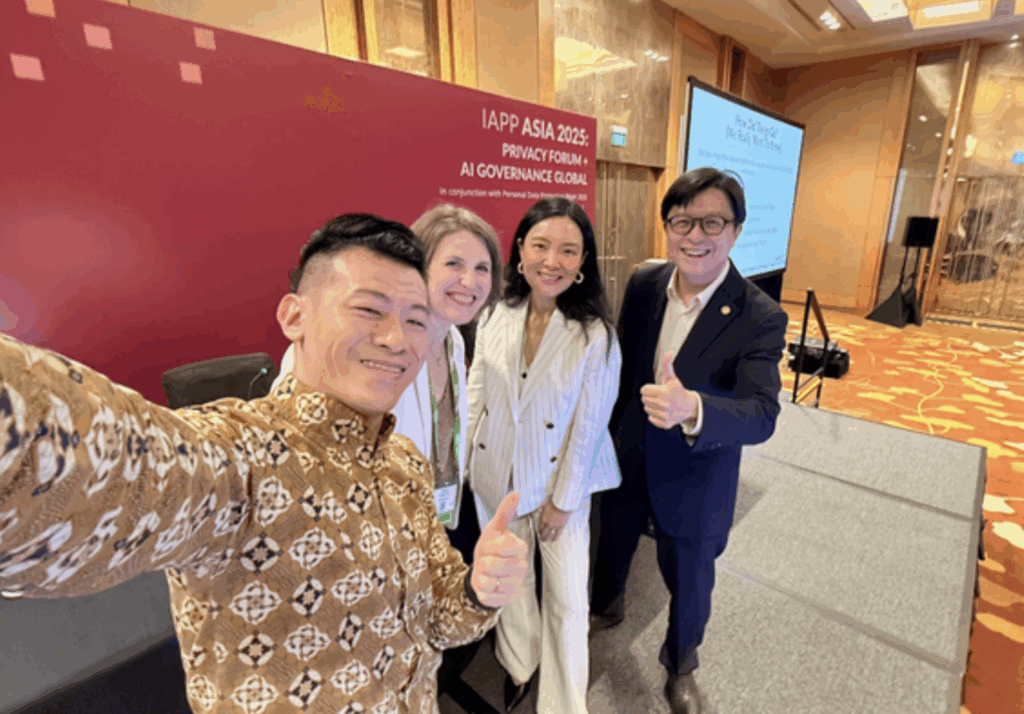
FPF and the “Shifting Sands: The Outlook for Cross Border Data Transfers in APAC” panel at IAPP July 10, 2025.
4.2 With updates to Australia’s Privacy Act, privacy is non-negotiable, and businesses can benefit from improving their privacy compliance processes and systems ahead of increased enforcement.
FPF’s APAC Deputy Director Dominic Paulger moderated a panel titled “Navigating the Impact of Australia’s Privacy Act Amendments in the Asia-Pacific.” The panelists included Dora Amoah, Global Privacy Office Lead at the Boeing Company, Rachel Baker, Senior Corporate Counsel for Privacy, JAPAC, at Salesforce, and Annelies Moens, the former Managing Director of Privcore. The panel discussed the enactment of the Privacy and Other Legislation Amendment Bill 2024 following a multiyear review of Australia’s Privacy Act, and the potential impact of these reforms on businesses.
Annelies shared an overview of the reforms, including:
- new transparency requirements for automated decision-making (ADM);
- revised cross-border data transfer mechanisms;
- new enforcement powers for the Office of the Australian Information Commissioner (OAIC), and
- a new statutory tort for serious invasions of privacy.
She mentioned that more changes could be coming, but some proposals – such as removing the small business exception – were facing resistance in Australia. However, irrespective of how the law develops, businesses can expect enforcement to increase.
The industry panelists shared their insights and experiences complying with the new amendments. Dora explained that despite the increased litigation risk from the new statutory tort for serious invasions of privacy, the threshold for liability was rather high as the tort required intent. She also noted that companies could avoid liability through implementing proper processes that prevent intentional or reckless misconduct.
Rachel noted that the Privacy Act’s new ADM provisions would improve consumer rights in Australia. She observed how Australians have been facing serious privacy intrusions that have drawn the OAIC’s attention, such as the Cambridge Analytica scandal, and the mis-use of facial recognition technology. She considered that since data subjects in Australia are increasingly expecting more rights, such as the right to deletion, businesses should go beyond compliance and actively adopt best practices.
Overall, the panel expressed the view that with this new reality, the role of the privacy professional in Australia, much like the rest of the world, is evolving to not just interpret and comply with the law but also to build robust systems through privacy by design.
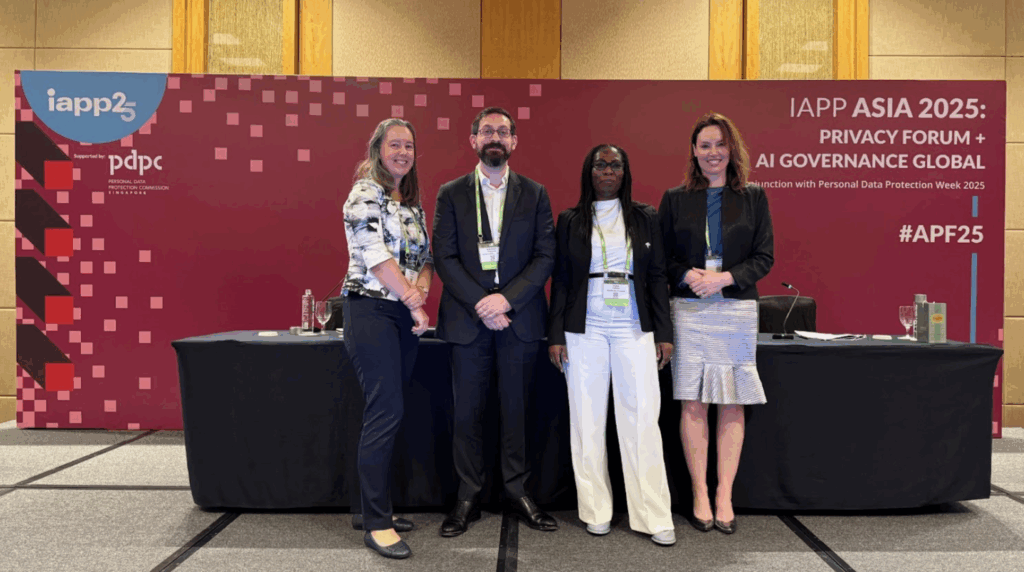
FPF and the panelists of “Navigating the Impact of Australia’s Privacy Act Amendments in the Asia-Pacific” at IAPP July 10, 2025.
5. FPF organized exclusive side events to foster deeper engagements with key stakeholders.
A key theme of FPF’s annual PDP Week experience has always been about bringing our global FPF community – members, fellows, and friends – together for deep and meaningful conversations about the latest developments. This year, FPF APAC organized two events for its members: a Privacy Leaders’ Luncheon (an annual staple), and for the first time, an India Luncheon co-organized alongside Khaitan & Co.
5.1 On July 8, 2025, FPF hosted an invite-only Privacy Leaders’ Luncheon.
This closed-door event provided a platform for senior stakeholders of FPF APAC to discuss pressing challenges at the intersection of AI and privacy, with a particular focus on the APAC region. During the session, the attendees discussed key topics such as the emerging developments in data protection laws, AI governance, and children’s privacy.
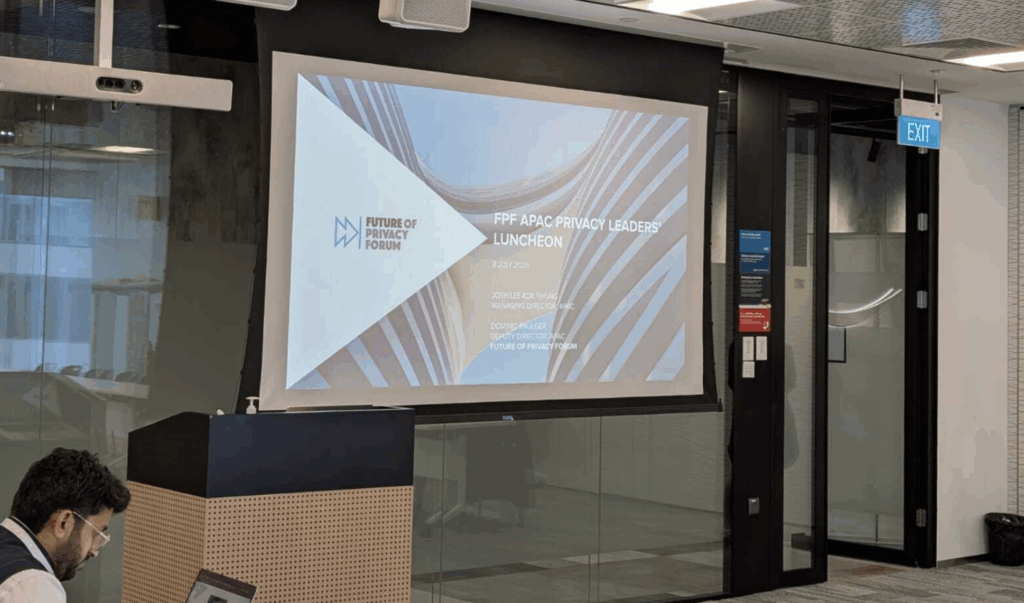
FPF’s Privacy Leaders Luncheon, July 8, 2025.
5.2 On July 10, FPF co-hosted an India Roundtable Luncheon with Khaitan & Co.
FPF APAC also collaborated with an Indian law firm, Khaitan & Co, to co-host a lunch roundtable focusing on pressing challenges in India, such as the development of implementing rules for the Digital Personal Data Protection Act, 2023 (DPDPA). The event brought together experts from both India and Singapore for fruitful discussions around the DPDPA and the draft Digital Personal Data Protection Rules. FPF APAC is grateful to have partnered with Khaitan & Co for the Luncheon, which saw active discussion amongst attendees on key issues in India’s emerging data protection regime.

FPF’s India Luncheon co-hosted with Khaitan & Co, July 10, 2025.
6. Conclusion
In all, it has been another deeply fruitful and meaningful year for FPF at Singapore’s PDP Week 2025. Through our panels, engagements, and curated roundtable sessions, FPF is proud to have been able to continue to drive thoughtful and earnest dialogue on data protection, AI, and responsible innovation across the APAC region. These engagements reflect our ongoing commitment to fostering greater collaboration and understanding among regulators, industry, academia, and civil society.
Looking ahead, FPF remains focused on shaping thoughtful approaches to privacy and emerging technologies. We are grateful for the continued support of the IMDA, IAPP, as well as our members, partners, and participants, who helped make these events a memorable success.
